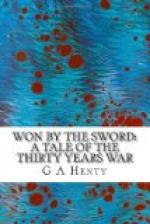“You see,” he said, “I am concerned rather in defensive positions at present than in seeing how we could best turn an enemy barring our advance. Although the greater portion of the dominions of the duchess has fallen into the hands of the enemy, she is fortunate in that the few places that remain are those that at once enable her to make a defence with comparatively small forces; and at the same time, it is possible for her to receive aid from France, or, if absolutely necessary, for her to fall back across the Alps. Susa, her headquarters, lying at the mouth of the valley up which the road over Mount Cenis finds its way, at once guards the pass and keeps open communication with France.
“It is, as it were, the handle of a fan, and can be approached by three main roads only, — those to Turin, Carignano, and Chivasso. Unfortunately Turin is in the enemy’s hands, but as the duchess’s troops still hold the citadel, an advance could not very well be made until that has fallen. Chivasso and Carignano are safe from any sudden attack. There are other minor roads, but so long as these towns are in our hands and held by strong garrisons, an enemy advancing by any of these roads towards Susa would be liable to have their communications cut, and their convoys captured by parties from these fortresses. It has long been a fixed idea in military operations that an army cannot advance as long as a town near the line of route is held by the enemy. That idea is an erroneous one, and several times upon the Rhine we have gained successes by neglecting this rule and disregarding the towns, contenting ourselves with leaving a force sufficient to keep the garrison in check.
“The Spaniards, however, are slow to change their tactics, good soldiers as they are. The consequence is that, although greatly superior in force, last year they made no offensive movement against us. We have had several regiments join us since we arrived here, and although I believe the enemy’s force to be twice as strong as our own, I have no doubt that the Count d’Harcourt will as soon as he arrives decide upon taking the offensive. You see our position here, guarded as it is on both flanks by the line of mountains, is as favourable for offence as defence, for we can advance either through Carignano on our right or Chivasso on our left; and however the enemy may dispose themselves they are vulnerable on one side or the other.”
This anticipation was justified. D’Harcourt arrived three days later. A council of war was held, and it was decided that an advance should at once be made against the enemy. The main body of the Spanish troops were posted in a fortified camp at Villanova, halfway between Asti and Turin. Leaving only a small body of troops to guard the lower valley of Susa from an attack by the Spaniards at Turin, the army advanced to Carignano, and thence towards Villanova. The Spaniards, however, although nearly twice as strong as the French, were so much surprised at the boldness of this proceeding that instead of marching out to give battle they contented themselves with strengthening still further the defences of their camp, and in order to force them to come out d’Harcourt advanced to Chieri — called by the French Quiers — a town situated between Villanova and Turin, and about two leagues distant from each.




